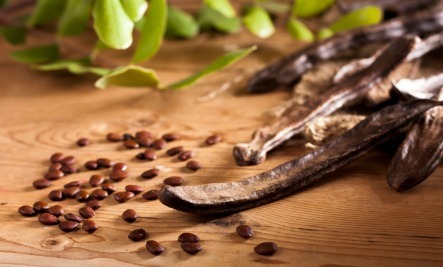Carob, often seen as a healthier alternative to chocolate, is derived from the pods of the carob tree (Ceratonia siliqua), native to the Mediterranean region. Unlike chocolate, carob is naturally sweet, caffeine-free, and packed with nutrients that offer a variety of health benefits. Whether you’re looking for a nutritious snack or an alternative to cocoa, carob is a great option. Here are 10 health benefits of incorporating carob into your diet.
1. Rich in Nutrients
Why it’s good: Carob is a great source of essential nutrients, including fiber, vitamins, and minerals.
What it provides:
- Vitamins: Carob contains vitamin A, vitamin B2 (riboflavin), and vitamin D, all of which support healthy skin, metabolism, and immune function.
- Minerals: It’s also rich in calcium, magnesium, potassium, and iron, which contribute to bone health, muscle function, and overall vitality.
Pro Tip: Eating carob as part of a balanced diet can help boost your daily nutrient intake.
2. High in Fiber
Why it’s good: Carob is an excellent source of dietary fiber, which is essential for digestive health.
What it does:
- Supports regular bowel movements
- Helps prevent constipation
- Aids in maintaining a healthy weight by promoting feelings of fullness
Pro Tip: Add carob powder to smoothies, baked goods, or oatmeal to increase your fiber intake.
3. Caffeine-Free Energy Boost
Why it’s good: Unlike chocolate, which contains caffeine and theobromine, carob is naturally caffeine-free, making it a great option for those sensitive to caffeine.
What it does: Carob provides a natural, gentle energy boost without the jittery side effects commonly associated with caffeinated products.
Pro Tip: Enjoy carob in the morning or as an afternoon snack without worrying about disrupting your sleep patterns.
4. Supports Heart Health
Why it’s good: Carob is rich in antioxidants, including polyphenols, which can help protect your heart.
What it does:
- Reduces oxidative stress and inflammation in the body
- Supports healthy cholesterol levels by reducing LDL (“bad” cholesterol)
- Promotes overall cardiovascular health
Pro Tip: Enjoy carob as part of a heart-healthy diet that includes fruits, vegetables, and healthy fats.
5. Natural Source of Antioxidants
Why it’s good: Carob is packed with antioxidants that can help fight free radicals in the body.
What it does:
- Protects against cellular damage
- Reduces the risk of chronic diseases, such as cancer and heart disease
- Supports healthy aging
Pro Tip: Incorporate carob into your diet regularly to boost your antioxidant intake and promote overall health.
6. Good for Weight Management
Why it’s good: Carob can aid in weight management due to its high fiber content and low-fat content.
What it does:
- Promotes a feeling of fullness, reducing the likelihood of overeating
- Low in calories, making it a guilt-free snack option
- Supports healthy digestion and metabolism
Pro Tip: Use carob as a healthy, low-calorie alternative to chocolate in your favorite recipes.
7. Supports Digestive Health

Why it’s good: The high fiber content of carob is beneficial for gut health.
What it does:
- Promotes the growth of healthy gut bacteria
- Supports regular bowel movements
- Helps alleviate symptoms of irritable bowel syndrome (IBS)
Pro Tip: Add carob to your diet as a digestive aid, particularly if you’re prone to digestive discomfort.
8. Rich in Calcium
Why it’s good: Carob is a good source of calcium, a mineral vital for maintaining strong bones and teeth.
What it does:
- Helps prevent bone loss and osteoporosis
- Supports muscle function
- Promotes healthy nerve function
Pro Tip: Pair carob with other calcium-rich foods like leafy greens or fortified plant milk for optimal bone health.
9. Helps Regulate Blood Sugar
Why it’s good: Carob is a low-glycemic food, which means it doesn’t cause rapid spikes in blood sugar.
What it does:
- Helps regulate blood sugar levels
- May be a good option for people with diabetes or those trying to manage their blood sugar
- Provides steady energy without crashes
Pro Tip: Substitute carob for high-sugar snacks or desserts to maintain stable blood sugar levels.
10. Natural Source of Iron
Why it’s good: Carob contains iron, which is crucial for oxygen transport and overall energy levels.
What it does:
- Supports healthy red blood cell production
- Helps prevent iron-deficiency anemia
- Promotes better energy levels and mental clarity
Pro Tip: If you’re vegetarian or vegan, carob can be a helpful source of iron when paired with foods that enhance iron absorption, like vitamin C-rich fruits.
Conclusion
Carob is more than just a tasty alternative to chocolate; it’s a nutrient-packed superfood with a wide range of health benefits. From supporting heart health and weight management to aiding digestion and boosting energy, carob is a versatile ingredient that can be easily incorporated into your diet. Try adding carob powder to smoothies, baking, or even as a sweet snack for a healthier, natural treat.

